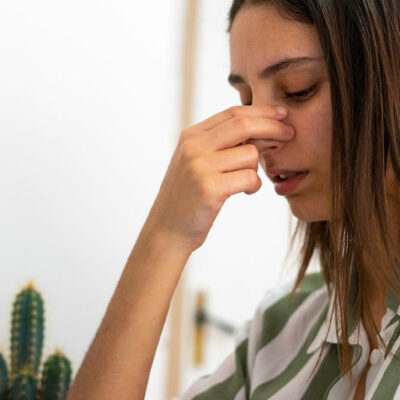11 useful tips for anxiety management

Nearly 84% of participants in a particular mental health survey were said to have some form of anxiety. The severity of symptoms did vary from person to person, but the fact remains that we live in a world where almost everything is a potential trigger for anxiety. And living in denial about having a psychological trigger only worsens the problem. Luckily, it is possible to manage anxiety by following the suggestions recommended by experts.
Identify the triggers
Anxiety is mainly triggered due to an event or episode where one finds themselves in a difficult position. It could be something that puts a person out of their comfort zone. Doctors advise people to identify these triggers and avoid them. Any comment, action, or situation that did not work out in favor triggers anxiety. So, make a list of such events and instances and ignore them the next time something happens related to that event. At the same time, try to remain positive as it can help strengthen the mind to manage anxiety better.
Keep busy
Distraction is one of the simplest ways to prevent a panic or anxiety attack. You can perform simple chores or indulge in a favorite task to stay physically and mentally occupied for a few hours. When the mind is occupied, there is hardly any scope for negative thoughts to trigger unnecessary overthinking. Some creative activities to boost cognitive performance include taking a walk, painting, drawing, listening to music, meditating, praying, and reading. You can opt for any of these to stay busy.
Try mindfulness techniques
Deep breathing and mindfulness techniques have helped thousands overcome their fear or anxiety time and again. Focused deep breathing is a method where one inhales for four counts and exhales for the same duration; this is practiced for minutes. It helps lower heart rate, which, in turn, calms the mind and body. Some quick yoga or aromatherapy can also help break away from the chain of thoughts that trigger anxiety, but these must be performed correctly for the best results.
Get sufficient sleep
Sleep deprivation is one of the significant triggers of anxiety and panic attacks. This is mainly because the mind and body are not rested enough to perform optimally. Doctors recommend a good eight hours of sleep for most adults to wake up fresh and energized the following day. If you find it hard to get quality sleep, try to limit screen time, establish a sleep routine, maintain the room temperature, and ensure the bed is comfortable.
Avoid excessive caffeine
Caffeine, found in coffee, tea, and some flavored sodas, is a beverage that raises blood pressure and triggers a spike in metabolic activities. Nutritionists advise switching to decaf and limiting the consumption of artificially flavored drinks, as it can adversely impact the body’s metabolic functions and lead to stress.
Exercise regularly
Exercise is a simple activity that helps release endorphins (also called feel-good hormones) in the body. Regular exercise can boost mood and make people stay in good spirits throughout the day. It also helps keep cholesterol levels in check, improving overall health. You may opt for any exercise you like, such as walking, swimming, and hiking.
Learn to manage expectations
It is better to focus on things under your control and not worry about the things you cannot do anything about. Life is unpredictable, and no amount of preparedness can help when something unexpected happens. So, work towards managing expectations and redirecting all your energy to things that are actually manageable. This change in attitude can help lower anxiety caused due to sudden shifts in situations or expected results.
Do not stress
Stress immediately raises the cortisol levels in the body, compromising the immunity system. It is also a significant trigger linked to panic and anxiety disorders. Although hard to do, it is crucial not to get stressed in any situation and to explore alternatives for stress management. Even stressing for a few minutes can severely impact blood pressure and blood sugar levels and increase the risk of health complications.
Maintain a healthy food chart
Nutritious foods keep the mind and body healthy. They supplement the daily vitamin, mineral, and other nutrient requirements, boosting immunity. Food also helps maintain a good mood and keep up spirits, thus boosting the production of natural endorphins. You may have to choose specific items rich in antioxidants, anti-inflammatory properties, healthy fats, and fibers, as these help boost metabolism and improve mood to manage anxiety better. This includes any comfort and go-to foods or beverages that boost mood.
Talk to a professional
Healthcare providers specializing in cognitive and behavioral training can help manage anxiety better. Therapy sessions, support groups, and anxiety management techniques that focus on specific triggers improve the long-term outlook of someone with severe symptoms. Confiding with friends and family members about your deepest fears or problems can also help you manage stress better over time. But remember, consistency is key here, as anxiety may relapse if there is a gap in therapy or support counseling. Mental health providers encourage patients to keep a journal and note down information about triggers or uncomfortable situations that cause stress. This information is incorporated into their healthcare plan to explore innovative treatments for managing anxiety.
Have an active social life
Humans are social beings. There are no ifs and buts about this life fact. Even the most introverted and shy person needs a confidant to interact with and share their feelings. It could be a group of friends, family members, and people in general with whom one can spend time sharing. Conversation helps declutter your mind and boosts your mood to overcome thoughts that might trigger anxiety.
Talk to a professional if these tips and remedies do not provide the expected results. Sometimes, underlying major depressive disorders could be the root cause of anxiety. Only doctors and therapists can help manage such disorders with timely intervention.








